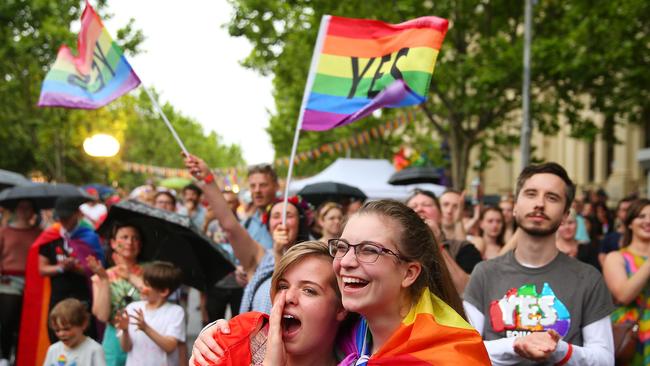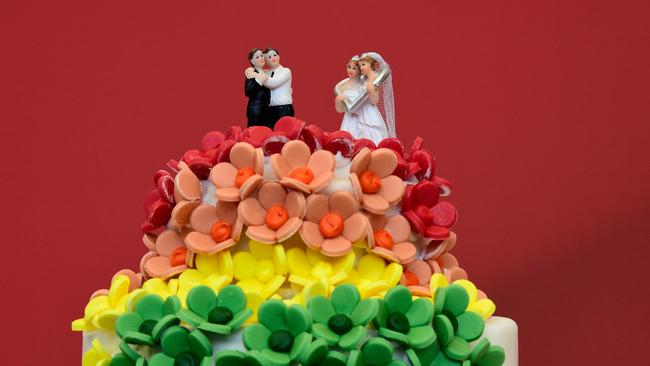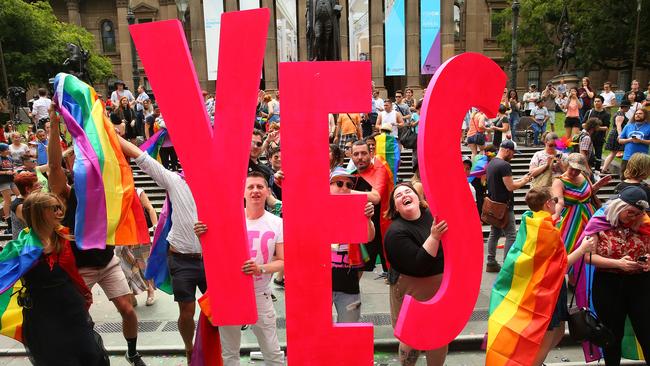Market forces will solve the gay cake non-issue
AUSTRALIA said Yes to same-sex marriage and if the current power of the Pink Dollar is anything to go by, our economy will benefit, writes Terry Sweetman.

Rendezview
Don't miss out on the headlines from Rendezview. Followed categories will be added to My News.
IN our house we tend to judge bakers by the standard of their meat pies.
Others, it seems, judge them by their willingness to bake cakes for gay weddings.
I confess that in my limited dealings I haven’t detected any overt homophobia in the flour and icing sugar trade but some people have seized on their alleged dilemma over whipping up a cake for same-sex couples.
But when it comes to protecting freedoms, I think bakery boycotts are about the least of our worries.
I wouldn’t want to disparage the sincerity of bakers (or florists, or dressmakers, or caterers) but I think market forces in the form of the so-called Pink Dollar will settle the issue more quickly than the politicians might.
Far from locking their doors, most bakers and other wedding singers will be salivating over the gay trade.
The Pink Dollar has been used for years to describe the purchasing power of the gay community.
And it’s massive.

A Roy Morgan Research paper last year found that gay men (especially) and women out-shop and out-buy straights by a wide margin.
It found that while men who considered themselves homosexual made up just 5.2 per cent of the male population (and that figure is debatable), they accounted for 11 per cent of the money spent on men’s clothing.
Just 3.1 per cent of women identified as homosexual but they accounted for 3.7 per cent of the money by women on clothing.
If they are that extravagant when it comes to frocks and jocks, imagine how lavish their weddings might be.
The number of homosexuals is a bit iffy for any number of reasons, not the least being a disinclination to come out and possibly be subjected to shame, embarrassment, harassment or discrimination.
Morgan research noted that between 2006-08, one in 42 Australians (2.4 per cent) over the age of 14 considered themselves homosexual.
By 2009-11 that figure had risen to one in 32 (3.1 per cent) and by 2012-14 to one in 29 (3.4 per cent).
Just in case you think this represents some kind of sexual identity epidemic, it probably just reflects more mature acceptance of homosexuality in general.
Significantly, older people are less inclined to publicly identify as homosexual than their juniors which must speak volumes for their experiences.
Other studies have shown much higher percentages of homosexuality, sometimes slanted to reflect specific political and social stands.

The Australian Human Rights Commission concedes a lack of data clouds the real numbers but reckons that people of “diverse sexual orientation, sex or gender identity” could make up to 11 per cent of the population.
One figure that seems indisputable is from the last census which found that there were at least 47,000 same sex couples in 2016, up from 33,000 in 2011 and 26,000 in 2006.
Oddly, the Marriage Alliance used that very figure to disparage the argument for same-sex marriage in the survey.
I suspect it is an understatement but you can bet your bottom dollar (pink or otherwise) that number will rise as people are allowed to marry and, more importantly, our collective tolerance levels rise.
You mightn’t like the idea of same-sex marriage, you might even fear or hate homosexuals, but you can’t pretend they don’t exist.
As a child and into my young adulthood I wasn’t consciously aware of homosexuals, although there were probably just as many as there are today.
They didn’t just stay in the closet; they nailed the door shut behind them for obvious reasons.
With maturity came the understanding that some men who shared digs, some close mates, some old girlfriends in tweeds and pearls, and even some rough and tumble, slap-on-the-back blokie blokes were in homosexual relationships even if they didn’t know it.
My three grandkids have known a gay couple — two beloved aunts — since they were in nappies.
The kids are now old enough to understand their aunts lead a different lifestyle but they don’t care. They barely notice.
The day we all barely notice and shrug with indifference will be the day we share full equality.
The marriage equality survey was a huge step along that road.


